 |
 |
 |
| |
Depression, Not Gender Identity, Tied to CVD Risk in US HIV+/HIV- Women
|
| |
| |
AIDS 2022, July 29-August 2, Montreal
Mark Mascolini
Cardiovascular disease (CVD) risk did not differ significantly between cisgender and transgender US women with or without HIV infection. But this 1875-woman cross-sectional study linked depression to more than 40% greater odds of a higher CVD risk score in a multivariate model [1]. Being white (versus black) and having HIV independently lowered odds of higher CVD risk.
Researchers from the University of North Carolina and collaborators from other US centers noted that women with HIV run a high risk of CVD, which may be influenced by hormone use and gender identity. Little research has addressed these issues in transgender women with or without HIV. To create a fair-sized study population, the investigators studied women in two cohorts: LITE Plus (adult black and Latina transgender women in Boston and Washington, DC) and the Women’s Interagency HIV Study (WIHS) (adult cisgender women with or at risk for HIV infection in 10 US cities).
The research team used the AHA/ACC Pooled Cohort Estimator Score to gauge CVD risk (https://tools.acc.org/ldl/ascvd_risk_estimator/index.html#!/calulate/estimator/). Variables in this tool are gender (female/male), age, race (black/nonblack), cholesterol, blood pressure, diabetes, and current smoking. A score above 7.5% signals an intermediate or higher 10-year risk of a cardiovascular event. The analysis classified all participants as female and included only women at least 40 years old. Parsing data from 2019-2020, logistic regression models incorporating ethnicity, HIV status, hormone use, and depression (by CESD-10 score) estimated odds ratios of having a CVD risk score above 7.5% according to self-reported cisgender or transgender status.
The study group consisted of 25 transgender women with HIV in LITE Plus, 1329 cisgender women with HIV in WIHS, and 521 cisgender HIV-negative women in WIHS. Age averaged about 54 years in all three groups, and proportions of blacks were 100% for transgender women, 60% for cisgender women with HIV, and 61% for cisgender women without HIV. Body mass index averaged around 32 kg/m2 in all three groups (in the obese range). Proportions of current smokers were 52% in the transgender HIV group, 33% in the cisgender HIV group, and 40% in the cisgender HIV-negative group. Similar proportions of transgender women with HIV and cisgender women with HIV had a viral load below 200 copies (84% and 81%). Average CD4 count also proved similar in transgender and cisgender women with HIV (708 and 734).
A higher proportion of transgender women used hormones (64%) than did cisgender women with HIV (4.5%) or cisgender women without HIV (4.8%). But a lower proportion of transgender women had a CESD-10 depression score above 10 (44% vs 71% and 72%). A slightly higher proportion of transgender women had CVD risk above 7.5% (24%) than did cisgender HIV-positive women (16.2%) or cisgender HIV-negative women (16.5%).
Multivariable logistic regression did not find that gender identity affected odds of a CVD risk score above 7.5%. CESD-10 depression score above 10 independently boosted odds of CVD risk above 7.5% (adjusted odds ratio [aOR] 1.43, 95% confidence interval [CI] 1.07 to 1.93). Every additional year of age boosted odds of an above-7.5% CVD risk score by 16% (aOR 1.16, 95% CI 1.14 to 1.18). Being white versus black cut odds of a CVD score above 7.5% by about 40% (aOR 0.59, 95% CI 0.39 to 0.91). Having HIV trimmed odds of a high CVD score by about 25% (aOR 0.74, 95% CI 0.56 to 0.97).
The researchers stressed that their analysis is limited by its cross-sectional design. They called for more study of these issues in greater numbers of transgender women with HIV.
Reference
1. Poteat TC, Rich AJ, Jiang H, et al. Cardiovascular disease risk in transgender and cisgender women living with and without HIV. AIDS 2022, July 29-August 2, Montreal. Abstract EPB092.
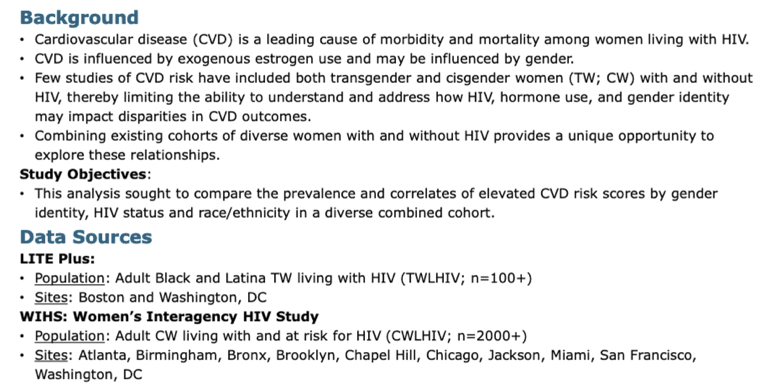
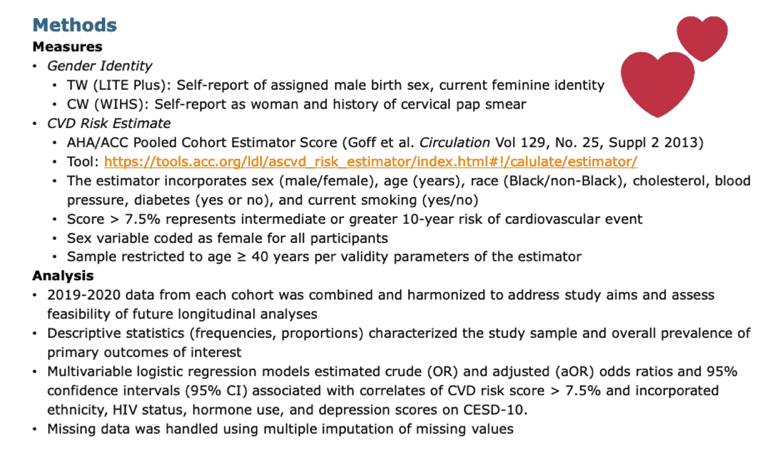
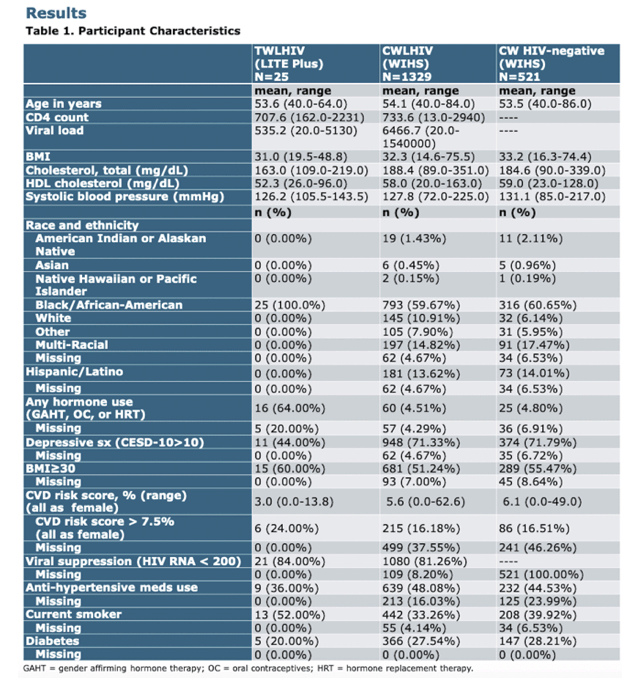
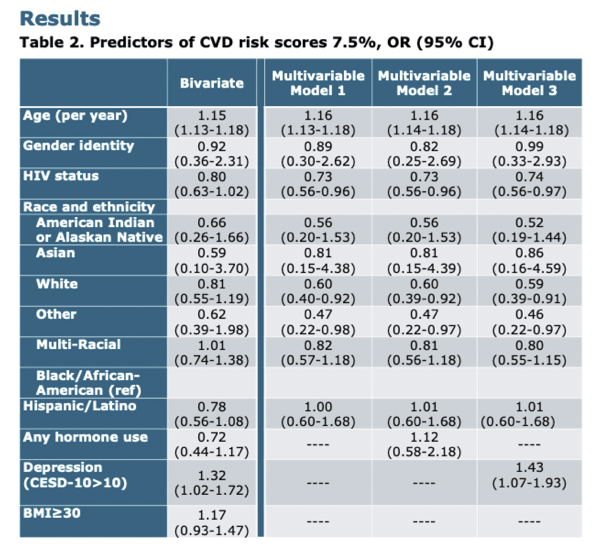
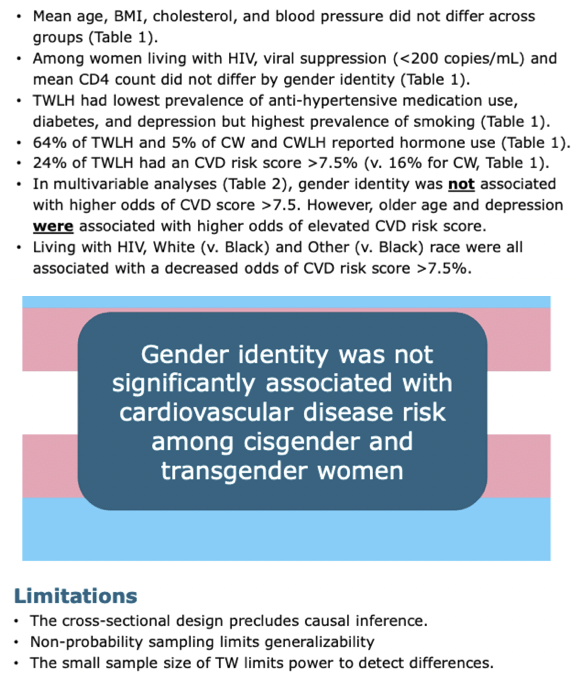
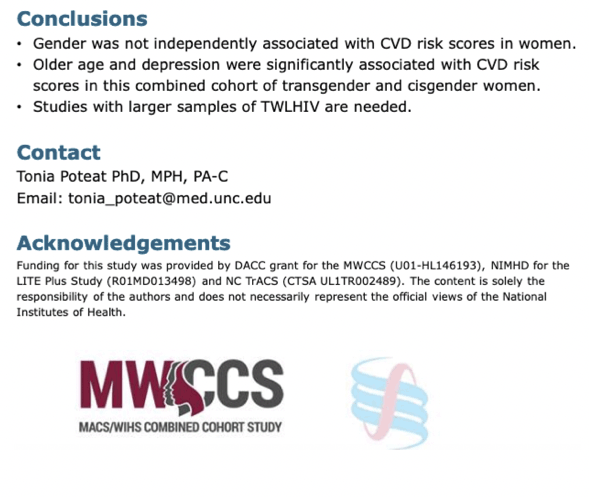
|
| |
|
 |
 |
|
|